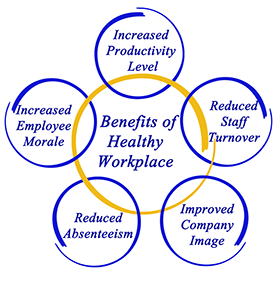The impact of obesity on employers
The impact of obesity
on employers



The worldwide cost of obesity is about the same as smoking or armed conflict and greater than both alcoholism and climate change, research has suggested.
In November 2014 the McKinsey Global Institute said it cost £1.3trillion, or 2.8 per cent of annual economic activity – it cost the UK alone £47billion. Some 2.1billion people – about 30 per cent of the world’s population – are overweight or obese, the researchers suggest.
And the problem—which is preventable—is rapidly getting worse. If obesity continues on its current trend, almost half of the world’s adult population will be overweight or obese by 2030.
So why should employers care about obesity…as long as revenues are “fat” and costs are “lean?” Here are just a few reasons:
How obesity affects the bottom line
Excess body weight can lead to many immediate and long term physical, psychological, and social ailments. Examples include musculoskeletal problems such as back, joint and muscular pain; chronic diseases like high blood pressure, diabetes and heart disease; cancers and psychological problems such as depression, anxiety and a general decreased sense of well-being.
Each of these ailments can then in turn decrease productivity, increase healthcare costs, and damage morale, which then affect a business’s bottom line. Several studies have shown that obesity leads to more missed work days and less productivity while at work.
One major monitoring tool the UK Government uses to look at the nation’s health is the Healthy Survey for England. It has found that 93 per cent of adults in England have at least one major health risk factor and more than a third have three or more established risk factors including overeating, binge drinking and failing to take regular exercise.
The survey showed that:
A third of men and half of women do not get enough exercise
Nearly two-thirds of adults are overweight or obese
Only a quarter eat the recommended five portions of fruit and vegetables a day.
Many adults consume more than twice the level of sugar they should.
The obesity crisis is escalating rapidly for businesses
A report from Public Health England states that men whose waist size is over 102cm (40.2 inches) are five times more likely to develop diabetes. Women with a waist over 88cm (34.7 inches) are three times more likely.
Being overweight or obese is the main avoidable risk factor for type 2 diabetes and the condition is now a major health risk for employers – with cases of all types of diabetes projected to rise to 4.6 million – nearly 10% of the UK adult population – by 2030.
Public Health England estimates that in 2012: 62% of adults (aged 16 years and over) were overweight or obese in England (with a BMI of 25 or above) 24.7% were obese (with a BMI of 30 or above) 2.4% were severely obese (with a BMI of 40 or above).
Obesity has increased dramatically since the 1990s, and some forecasts predict that by 2050 obesity will affect 60% of adult men and 50% of adult women.
How much is secret snacking costing your business?
A recent survey on British eating habits at work looked at unhealthy snacking in the workplace. The top three snacks were found to be biscuits, chocolate and crisps with healthy choices like fruit and yoghurt lagging far behind.
The research by food manufacturer Fruyo discovered that a third of all snacking occurs at people’s desks. Almost one in 10 workers admitted snacking in secret, either behind their computer screens or in the toilets.
Media, marketing and design workers blamed stress for unhealthy snacking. Almost half of health sector professionals reached for treats on a daily basis, with teachers and accountants close behind.
What Slimpod is doing to make a change
Through our clinically-proven and medically-endorsed Slimpod programmes, we offer a unique solution for sustainable weight loss.
Our natural, neuroscience based approach enables people to control their eating, change their relationship with food and live happier lives. In the past 10 years, more than 200,000 people worldwide have made significant changes to their lifestyles.
Our weight loss technique is the only one of its kind in the world to have successfully undergone clinical trials at City University London and has been endorsed by an NHS consultant, who tried it himself and wrote in his report: “I found the effects to be profound and positively life-changing.”

